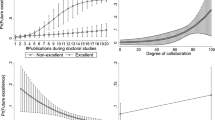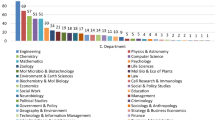Abstract
Doctoral graduate research performance (DRP) is recognized as one of the most critical indices for evaluation of the success of doctoral education. Doctoral graduates with high research performance directly reflect a higher ability in academic research and academic achievement. Consequently, identifying which factors influence DRP is potentially of great value. This topic is also challenging because of difficulties in identifying the impact factors on research performance and the feasibility of the relative data collection. This paper first examines the relationships between the indicators and DRP. After a review of previous literature, the focus is on the doctoral graduates’ individual factors, advisor factors and learning performance. Data is collected from graduated doctors from the Science Schools of University of Science and Technology of China (USTC). Contrary to expectations, our findings indicate that, based on the Chinese context, learning performance does not appear to be strongly associated with research performance. Individual factors (status of academic origin) do have significant effect on DRP. The advisor factors (including academic status, academic experience and allocation of energy) show a relatively strong association with DRP, in terms of both the number of publications and the impact factor of Science Citation Index (SCI) cited journals.

Similar content being viewed by others
Notes
In China, 81 scientists were first awarded Science Academician by NSFC in 1948.
The award of Excellent Young Scholar began in 1994 by NSFC; its purpose is to attract overseas Chinese and foreign students to come back to the motherland.
The award of Yangtze River Scholar is carried by NSFC in 1998; its purpose is to cultivate outstanding scholars and improve the quality of higher education.
The full name for CNKI is China National Knowledge Infrastructure. The databases of CNKI are the largest academic journals database in China, and the greatest Chinese database in the world.
The full name for Scholar OA is Scholar open access.
References
Anseel, F., Duyck, W., De Baene, W., & Brysbaert, M. (2004). Journal impact factors and self-citations: Implications for psychology. American Psychologist, 59(1), 49–51.
Astin, H. S. (1969). The woman doctorate in America. New York: Russell Sage Fondation.
Astin, H. S. (1978). Factors affecting women’s scholarly productivity. In A. S. Astin & W. Z. Hirsch (Eds.), The higher education of women: Essays in honor of Rosemary Park (pp. 133–157). New York: Praeger.
Astin, H. S., & Davis, D. E. (1985). Research productivity across the life and career cycles: facilitator and barriers for women. Reprinted in J.S. Glazer: E.M. Bensimon.
Baird, L. (1991). Publication productivity in doctoral research department: Interdisciplinary and interdisciplinary factors. Research Higher Education, 32(3), 303–318.
Bayer, A. E., & Dutton, J. (1977). Career age and research-professional activity of academic scientists. Journal of Higher Education, 48(3), 259–282.
Bentley, R. J., & Blackburn, R. T. (1990). Relationship of faculty publication performance with age, career age, and rank. Portland, OR: Annual meeting of the Association for the Study of Higher Education.
Blackburn, R. T., Behymer, C. E., & Hall, D. E. (1978). Research note: Correlation of faculty publications. Sociology of Education, 51, 132–141.
Braxton, J. M., & Bayer, A. E. (1986). Expectations and support for scholarly activity in schools of business. Journal of Education for Business, 61(3), 101–105.
Brewer, G. A., Douglas, J. W., FacerII, R. L., & O’Toole, L. J. (1999). What’s in a Name? Comparing DPA and Ph.D. programs. Journal of Public Affairs Education, 5(4), 309–317.
Brown, L. D. & Huefner, R. J. (1994). The familiarity with and perceived quality of accounting journals: View of senior accounting faculty in leading U.S. MBA programs. Contemporary Accounting Research, 11(1–1), 223–250.
Bucheit, S., Collins, A. B., & Collins, D. L. (2001). Intra-institutional factors that influence accounting research productivity. The Journal of Applied Business Research, 17(2), 17–31.
Canibano, C., Otamendi, J., & Andujar, I. (2008). Measuring and assessing researcher mobility from CV analysis: The case of the Ramony Cajal programme in Spain. Research Evaluation, 17(1), 17–31.
Carter, C. R. (2002). Assessing logistics and transportation journals: Alternative perspectives. Transportation Journal, 42(2), 39–50.
Chen, C. C. (2008). The of value knowledge created by individual scientists and research groups. Journal of Scholarly Publishing, 39(3), 274–293.
Chow, C. W., & Harrison, P. (1998). Factors contributing to success in research and publication: Insights of “influential” accounting authors. Journal of Accounting Education, 16(3/4), 463–472.
Cole, J., & Singer, B. (1991). A theory of limited differences: explaining the productivity puzzle in science. In H. Zukeman, J. Cole, & J. Bruer (Eds.), The outer circle: women in the scientific community. New York: Norton.
Delamont, S., Atkinson, P. A., & Parry, O. (2000). The doctoral experience: Success and failure in graduate school. London: Falmer Press.
Denicolo, P., & Pope, M. (1994). The postgraduate’s journey—An interplay of roles. In Y. Ryan (Ed.), Quality in postgraduate education (pp. 120–133). London: Kogan Page.
Diamond, A. (1986). What is a citation worth? Journal of Human Resource, 21, 200–215.
Dundar, H., & Lewis, D. R. (1998). Determinants of research productivity in higher education. Research Higher Education, 39(6), 607–631.
Ferris, J. M., & Stallings, R. A. (1988). Sources of reputation among public administration and public affairs program. American Review of Public Administration, 18(3), 309–323.
Fosu, A. K. (2006). The research productivity of black economists: Ranking by individuals and doctoral alma mater—Comment. The Review of Black Political Economy, 33(3), 45–49.
Fox, M. F. (1999). Gender, knowledge, and scientific styles. Annals of the New York Academy of Sciences, 869(1), 89–93.
Fox, M. F., & Mohapatra, S. (2007). Social-organizational characteristics of work and publication productivity among academic scientists in doctoral-granting departments. The Journal of Higher Education, 78(5), 542–571.
Garfield, E. (1979). Citation indexing: Its theory and applications in science, technology, and humanities. New York: Free Press.
Gelso, C. J. (1979). Research in counseling: Methodological and professional issues. Counseling Psychologist, 8(3), 7–36.
Grant, B. & Graham, A. (1994). Guidelines for discussion: a tool for managing postgraduate supervision. In Y. Ryan (Ed.), Quality in postgraduate education, pp. 165–177. London: Kogan Page.
Grigg, L., & Sheehan, P. (1989). Evaluating research: The role of performance indicators. Brisbane: University of Queensland.
Hall, B. H., Mairesse, J., & Turner, L. (2007). Identifying age, cohort, and period effects in scientific research productivity: Discussion and illustration using simulated and actual data on French physicists. Economic Innovation and New Technology, 16(2), 159–177.
Hamovitch, W., & Morgenstern, R. D. (1977). Children and productivity of academic women. Journal of Higher Education, 48(6), 633–645.
Hartley, J. E., Monks, J. W., & Robinson, M. D. (2001). Economists’ publication patterns. American Economist, 45(1), 80–85.
Heath, T. (2002). A quantitative analysis of PhD students’ views of supervision. Higher Education Research & Development, 21(1), 41–53.
Hill, T., Acker, S., & Black, E. (1994). Research students and their supervisors in education and psychology. In R. G. Burgess (Ed.), Postgraduate education and training in the social sciences: Processes and products (pp. 53–72). London: Jessica Kingsley.
Hogan, T. D. (1981). Faculty Research Activity and the Quality of Graduate Training. Journal of Human Resources, 16(3), 400–415.
Jones, A. W. (2003). Impact factors of forensic science and toxicology journal: What do the number really mean? Forensic Science International, 133(1–2), 1–8.
Konrad, A. M., & Pfeffer, J. (1990). Do you get what you deserve? Factors affecting the relationship between productivity and pay. Administrative Science Quarterly, 35(2), 258–285.
Laband, D. N., & Piette, J. P. (1994). The relative impacts of economics journal: 1970–1990. Journal of economics literature, 32(2), 640–666.
Lindsey, D. (1989). Using citation counts as a measure of quality in science. Scientometrics, 15(3–4), 189–203.
Long, J. S. (2001). From scarcity to visibility: Gender differences in the careers of doctoral scientists and engineers. Washington, DC: National Academy Press.
Long, R. G., Bowers, W. P., & White, M. C. (1998). Research performance of graduates in management effects of academic origin and academic affiliation. Academic of Management Journal, 41(6), 704–714.
Manis, J. (1951). Some academic influences upon publication productivity. Sociological Forces, 29(3), 267–272.
Meho, L. I., & Sonnenwald, D. H. (2000). Citation ranking versus peer evaluation of senior faculty research performance: A case study of Kurdish scholarship. Journal of the American Society for Information Science, 51(2), 123–138.
Milburn, L. S., & Brown, R. D. (2003). The relationship of age, gender, and education to research productivity in landscape architecture faculty in north America. Landscape Journal, 22(1), 54–62.
Moed, H. F., Burger, W. J. M., Frankfort, J. G., & van Raan, A. F. J. (1985). The use f bibliometric data as tools for university research policy. International Journal of Institutional Management in Higher Education, 9, 185–194.
Neuberger, J., & Counsell, C. (2002). Impact factors: Uses and abuses. European Journal of Gastroenterology and Hepatology, 14(3), 209–211.
Ogbogu, C. O. (2009). An analysis of female research productivity in Nigerian universities. Journal of Higher Education Policy and Management, 31(1), 17–22.
Prpic, K. (2000). The publication productivity of young scientists: An empirical study. Scientometrics, 49(3), 453–490.
Reinstein, A., & Hasselback, J. R. (1997). A literature review of articles assessing the productivity of accounting faculty member. Journal of Accounting Education, 15(3), 425–455.
Roberts, K. (1997). Nurse academics’ scholarly productivity: Framed by the system, facilitated by mentoring. Australian Journal of Advanced Nursing, 14(3), 3–14.
Royalty, G. M., & Magoon, T. M. (1985). Correlated of scholarly productivity among counseling psychologists. Journal of Counseling Psychology, 32(3), 458–461.
Shim, S., O’Neal, G., & Rabolt, N. (1998). Research attitude and productivity among faculty at four-year U.S. institutions: A socialization perspective. Clothing and Textiles Research Journal, 16(3), 134–144.
Stack, S. (2004). Gender and scholarly productivity. Sociological Forces, 35(3), 285–296.
Theoharakis, V., & Hirst, A. (2002). Perceptual differences of marketing journals: A worldwide perspective. Marketing Letters, 13(4), 389–402.
Tien, F. F., & Blackburn, R. T. (1996). Faculty rank system, research motivation, and faculty research productivity: Measure refinement and theory testing. Journal of Higher Education, 67(1), 2–11.
Ventriss, Curtis. (1995). The rating system: Determining what constitutes a quality public administration program. Journal of Public Administration Education, 1(2), 142–153.
Wallmark, J. T. & Sedig, K. G. (1986). Quality of research by citation measured method and by peer review—A comparison. IEEE transactions on Engineering Management, EM-33(November), 218–222.
Wanner, R., Lewis, L., & Gregorio, D. (1981). Research productivity in academia: A comparative study of the sciences, social sciences, and humanities. Sociological Education, 54(4), 238–253.
Whitely, W., Dougherty, T. W., & Drher, G. F. (1991). Relationship of career mentoring and socioeconomic origin to managers’ and professionals’ early career progress. Academy of Management Journal, 34(2), 331–351.
Wood, F. (1990). Factors influencing research performance of university academic staff. Higher Education, 19(1), 81–100.
Xie, Y., & Shauman, K. (1998). Sex differences in research productivity. American Sociological Review, 63(6), 847–870.
Yoakum, J. C. (1993). Research productivity of home economic education faculty in public doctorate-granting university [Ph.D.diss.]. Columbus: The Ohio State University.
Zhou, D., Ma, J., & Turban, E. (2001). Journal quality assessment: An integrated subjective and objective approach. IEEE Transactions on Engineering Management, 48(4), 479–490.
Acknowledgments
In the course of this research, many teachers and officers have given us help in collecting the data of doctoral graduates’ information. Without their help, this research might have been suspended. Therefore, we would like to express our special thanks to these teachers and officers from USTC, including the President of the Graduate School and many officers from the Graduate Education Center, such as Office of Admission, Office of Education Affairs, Office of Discipline Construction, Office of Professional Degrees, Comprehensive Office, Office of Degree Authorization, and the Evaluation Center of Academic Degree and Graduate Education.
Author information
Authors and Affiliations
Corresponding author
Rights and permissions
About this article
Cite this article
Gu, J., Lin, Y., Vogel, D. et al. What are the major impact factors on research performance of young doctorate holders in science in China: a USTC survey. High Educ 62, 483–502 (2011). https://doi.org/10.1007/s10734-010-9400-0
Published:
Issue Date:
DOI: https://doi.org/10.1007/s10734-010-9400-0




